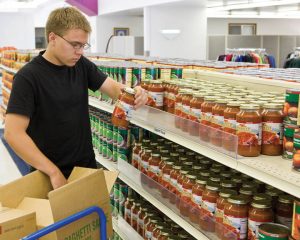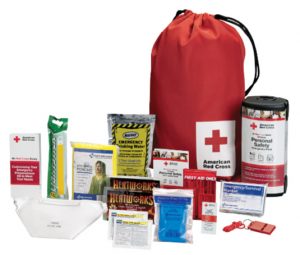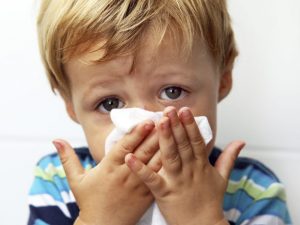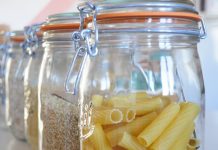
This article is syndicated from Meridian Magazine.
Although much of this article refers to preparing for a pandemic or community health emergency the same preparations will provide safety and harmony in your home during a blizzard, extended power outage, or civil unrest when you may need to hunker down in your own home for weeks or even months.
Health agencies disagree on the size of the ideal home store when preparing for a community, nationwide or worldwide large-scale health emergency, ranging from recommendations of a ten-day to three-month supply, with most now recommending a three-month supply. As an emergency approaches, retail store shelves will be rapidly stripped of all supplies. As we have seen, when storm warnings are issued it takes only minutes for shelves to empty and may be days before new supplies arrive. The same will happen once the first signs of a pandemic appear.

Since even the seasonal flu can take weeks to go through a family, a three-month supply should be the goal. You may remember in my last article, Is Another Pandemic Around the Corner? I cited examples of communities who self-quarantined voluntarily. The most successful quarantines lasted a minimum of two months. You may also be called upon to help family members and friends, and you will want to be prepared.
If you live in the country on a few acres, your home is the ideal place to self-quarantine during a pandemic—and perhaps with nearby family and extended family. This will allow the children to play outside occasionally without exposure to others who may be carrying the virus. A rural setting would also allow contaminated garbage to be kept far from the house. If you have this rural advantage, you are the likely refuge for your extended family and will need to store more food and water to be ready.
Related Link: How to Gather Food Storage When You’ve Got No Space (or Money)
Don’t forget the needs of pets. Store food, water and medications for them as you would any other member of the family.
Stock up on:

- Prescription drugs to ensure a continuous supply in your home. You may ask your doctor if he has samples or can help you to lawfully prepare. This is especially important for medications such as insulin that cannot be rationed.
- First-aid supplies
- Nonprescription drugs including pain and fever relievers, stomach remedies, anti-diarrhea medications, and cough and cold medicines and preventive medications
- Benadryl. During emergencies, allergies and bee stings may still happen. Store children’s doses in tablet form. They will last longer and the dosage is based on weight so adults just need to take a little more.
- Remember, never give young children aspirin. Purchase medications specifically designed for children.
- Fluids with electrolytes
- Vitamins
- Anti-bacterial wipes for cleaning up after attending to a patient
- Hand sanitizers should also be included in your first aid supplies. These should be used every time you are with someone who is ill or after you shake hands with anyone.
- Make sure you also have at least one thermometer on hand and alcohol to clean it
- Medical gloves are essential. Purchase a variety of sizes for the needs of all family members. Remember, some gloves are latex—so if you think you may have a latex allergy use care in selecting gloves.
- N95 particulate face masks. These will help prevent the transfer of germs as you are in public or caring for a loved one. There are many types of medical masks. The surgical variety will provide added protection from fluids. These are especially valuable when you are caring for someone who is sweating, sneezing, or vomiting. For the best protection, these need to fit firmly against the face. If you are using masks for children place the mask on the face and then a bandana. Be sure the bandana is a thin fabric so the child can still breathe! This will help to hold the mask firmly on their face. It can be like dress up! Make sure you remove the bandana and place it directly into the washer. Then discard the mask, preferably outside, and wash your child’s hands, face and exposed skin thoroughly with a hand sanitizer. I have heard people advise that masks do not need to be stored because they cannot be fitted tightly enough to the face. So long as hospitals, police, and fire departments and schools are stocking up with supplies of masks for all their staff and students, I am stocking face masks, too. When they no longer consider it important, I will stop. Until then, I believe it is important.
- Paper plates, cups, bowls, and utensils will cut down on the possibility that germs will be passed as meals are cleared. They will also save precious time for those who are the caregivers and a must-have should the power fail.
- Paper towels become essential items for keeping your home germ free.
- Stock up on TP and facial tissues with anti-bacterial properties…you will use more than you think during a time of illness. Each family will need a different amount of these items. Don’t guess what your need will be. For at least one month keep track of how many rolls of toilet paper and how many boxes of tissues you use. [Pay attention especially] as cold season is beginning so your family will begin using many more tissues. I suggest you place the wrapper from the TP roll in a drawer and at the end of the month count how many you have used. You can multiply this number by three to understand how much you need to store. Add an additional 25%-50% more to prepare for a pandemic as family members will all be home all day long, and some family members are likely to be ill.
- Large plastic trash bags for soiled clothing, towels, and trash
- Liquid soaps: liquid laundry, hand, and dish soaps will be much more useful if there is an interruption in your utility service.
- Bleach and/or hydrogen peroxide for laundry and cleaning, and other disinfectant cleaning supplies should be stored now.
- Alternative to electricity.
- For light: Flashlights, glow sticks, and/or lanterns, and batteries
- For heat: Firewood, non-electric heaters (propane or kerosene—follow manufacturer instructions for safety), and heavy blankets and/or sleeping bags
- For Cooking: Portable propane cook stove, barbecue grill, and fuel, can opener
- For Laundry: large tub for washing laundry, rope for a clothesline and clothespins
- For Communications: Battery/solar/crank radio and/or TV to keep up on the news and health warnings
- Water: Bleach and other items needed for purification.
- Sanitation needs: Port-a-potty with chemicals and liner, kitty litter or sand to help absorb waste and a plan to bury your waste away from your home. You will also need to be prepared to bury or otherwise dispose of everyday trash in case services are suspended temporarily.
- Entertainment: Just think about three months at home with no place to go. Talk about cabin fever! Consider purchasing DVDs that you know your children or spouse would like to have. Keep them put away until they are needed or until the next major gift-giving occasion. Then, replace the old with new titles. Remember if there is widespread illness there may not be people to man the facilities at TV stations and streaming services. You can also establish a stash of age-appropriate books, magazines, puzzles, and games. Reading a few classic books as a family would also be a great way to pass the time. Stock up on craft supplies and even a new hobby to start with the kids. Cooking can be lots of fun together so make sure your three-month supply includes ingredients to make some fun snacks and meals. A sense of humor is key to survival, so be sure to choose entertainment that is fun, funny and uplifting.
- Cash: Should the power fail ATM machines and credit cards will not work. Have a stash of small denomination bills on hand for emergencies when you are forced to leave your home.
- Gas up: As soon as you hear the flu has come to your region, fill all your cars. Not only will supplies be hard to come by, but if the power fails, so do the pumps.
- Develop a list of health care providers in your area including clinics and hospitals. Include friends in health care, who you can call at home to get advice or direction.
- A bell or whistle for your patient to sound when they are in need of help. A whistle can be heard much easier than the human voice.

Whether you are trying to prevent disease or prevent it from spreading, you will want to take precautions in every aspect of your family routine. Now is the time to start by teaching and practicing good habits.
Teach your family the proper way to wash their hands. You do not need to use hand sanitizers on a daily basis. In fact, this can prove dangerous as sanitizers kill all germs, good and bad. Hands should be washed with plenty of water, soap, and scrubbing. Practice rubbing all the surfaces of the hands, including the fingernails and between fingers, under running water every time you wash. Since this needs to take some time children can learn to be patient and sing either Happy Birthday or the ABC Song while scrubbing. This will help them to recognize the length of time necessary to do a thorough washing.
Avoid shaking hands with someone who is ill, begin the habit now. If this is impossible, thoroughly wash your hands as soon as possible or use a hand sanitizer.
Teach family members to always cough or sneeze into a tissue. If this is impossible teach them to cover their face with their arm, not their hands. Simply bend your arm and place your elbow over your mouth. This reduces the likelihood that you will pass germs along to others as you shake hands or touch objects they may also be handling.
Remind your family to stay away from those who are ill. Please don’t send an ill child to school, to music lessons, or even to church when they are ill. We could avoid so much heartache if everyone would make it a practice to stay home when they are ill.
Have each family member clear their own dirty dishes after each meal. During a period of illness, you will use paper plates and have them place their dishes in an outside garbage can. Get a large plastic garbage can that you can set outside the door in the event of emergencies like a pandemic. Dispose of any wet or contaminated garbage in that can. This will help keep germs outside, instead of inside your home.
Decide now which room in your home will be used to care for those who are ill. A room with its own bathroom is the best. You will want to keep a patient as far away from healthy family members as possible. Be sure to have several sets of sheets for the bed or beds in that room.
Related Link: 8 Emergency Preparedness Tips for Families
Design a plan to care for extended family and friends if they should become ill and have no one to care for them. In some cases, it will be better to have them move in with you at the beginning of the pandemic and hopefully avoid becoming ill as they self-quarantine with your family.
Prepare now to work from home if at all possible. You should discuss this with your employer and develop a plan now. If you are a first responder, be sure your employer is prepared for the employees to maintain a self-quarantine at your workplace.
Check with your child’s school to determine if they have a plan for a pandemic. Will they continue to teach using the Internet or a cable TV station?
There is a limit to what the government or the health care community can do in advance of a pandemic outbreak. The U.S. Federal Government, the World Health Organization, and others are monitoring the flu, as well as other pandemic threats closely. The United States has active national as well as international programs for manufacturing, pre-positioning, and stockpiling antiviral drugs, masks, and other supplies. A lesson we have learned from the response to hurricanes, floods, and the destruction caused by tornadoes and earthquakes, we need to be prepared to care for all of our own needs.
In the United States, former Secretary Leavitt of the Department of Health and Human Services (DHS) has stated that “any community [or individual] that fails to prepare—with the expectation that the federal government can come to the rescue—will be tragically wrong” (April 10, 2006).
This article was written by Carolyn Nicolaysen, a featured author at Meridian Magazine.
Nicolaysen joined the Church while attending Central College in Pella, Iowa, where she earned a degree in home economics education with an emphasis on foods and nutrition and a minor in science. Nicholaysen has taught emergency preparedness for thirty years.
Having lived in areas where she experienced hurricanes, ice storms and tornadoes, and now living in a flood and earthquake-prone region, she has developed a passion for readiness. She has also received first responder training from FEMA.
Her published works include: Mother Hubbard: What She’s Doing Now, Prep Not Panic – Keys to Surviving the Next Pandemic, and That Won’t Happen To Me.




